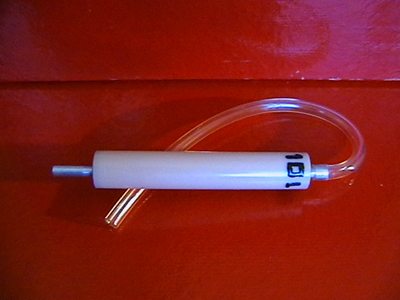Acetone and glycol has the ability to reduce the need for a long injector opening time. It also seems to raising the power. Unlike glycol decreases fuel consumption slightly. The reduction is very marginal, but not entirely negligible. A small reduction in consumption has been noted.
For those who convert gasoline cars to low-energy fuels with gasoline content will acetone works like an opening-time reducer. Since the fuel properties after the acetone additive behaves as a fuel with higher energy content, than it was before the addition of acetone. In comparison with the consumption declining is the declining of the pulse-width, greater. A trip computer will show a large reduction in the consumption - but in the reality it is only the pulse width/opening time that has been reduced.
For E85, it is important that acetone only dispensed after the amount of gasoline. Probably one can classify acetone as an ignition improver, which makes burning faster/more efficient - there is therefore not the energy in the fuel that has increased. Acetone appears to have the same positive effects on diesel like it has for petrol but there is nothing that I've been able to examine.
Acetone as an additive is used in very small doses and should not affect material with the view of acetone ability to dissolve plastics, etc. However, the presence of PVC plastic is straight inappropriate, as PVC absorbs acetone. An additive that contains acetone loses their beneficial properties in contact with PVC.

For dosing can a special pipette be used. It is made from a VPC tube with aluminium ends, fixed with Biltema's ”Steel Epoxy”. If the tube part slightly is longer than the required dose, it becomes easier to adjust the level.
With support from my experience based on a series of tests can the dose of acetone be determined.
The involvement of acetone can be determined by the following proportions -
For 10 gallon of gasoline dispensed 2.3 oz acetone. The dose is thus 0.18 %
Most likely is the same ratio also for diesel?
The quantity can also be calculated by a formula -
Amount of acetone = Amount of gasoline x 0.0018
Ethanol fuels - E85.
The involvement of acetone can be determined by the following amount of normal proportions of E85 (15 %):
For 10 gallons of E85 dosed 0.35 oz of acetone and for 20 gallons of E85 dosed 0.70 oz of acetone.
The quantity can also be calculated by three equations.
For E75: Amount of acetone = Amount of fuel x 0.00045
For E85: Amount of acetoe = Amount of fuel x 0.00027
For E90: Amount of acetone = Amount of fuel x 0.00018
The involvement of acetone can be determined by the following amount of normal proportions of E85 (15 %):
For 10 gallons of E85 dosed 0.35 oz of acetone and for 20 gallons of E85 dosed 0.70 oz of acetone.
The quantity can also be calculated by three equations.
For E75: Amount of acetone = Amount of fuel x 0.00045
For E85: Amount of acetoe = Amount of fuel x 0.00027
For E90: Amount of acetone = Amount of fuel x 0.00018
Keep in mind that too much acetone gives the reverse effect and therefore lower efficiency!
|
| |
|
| |



